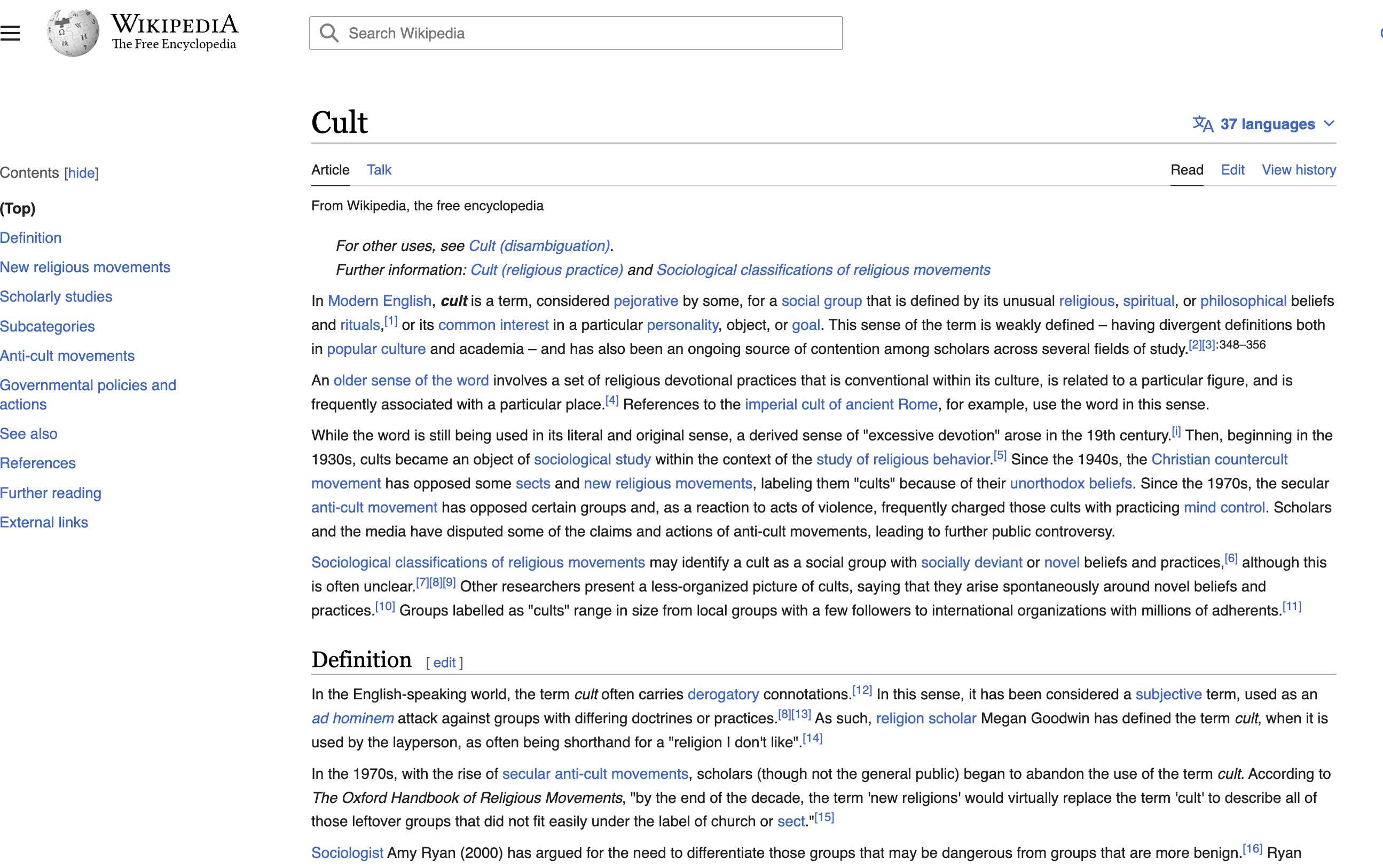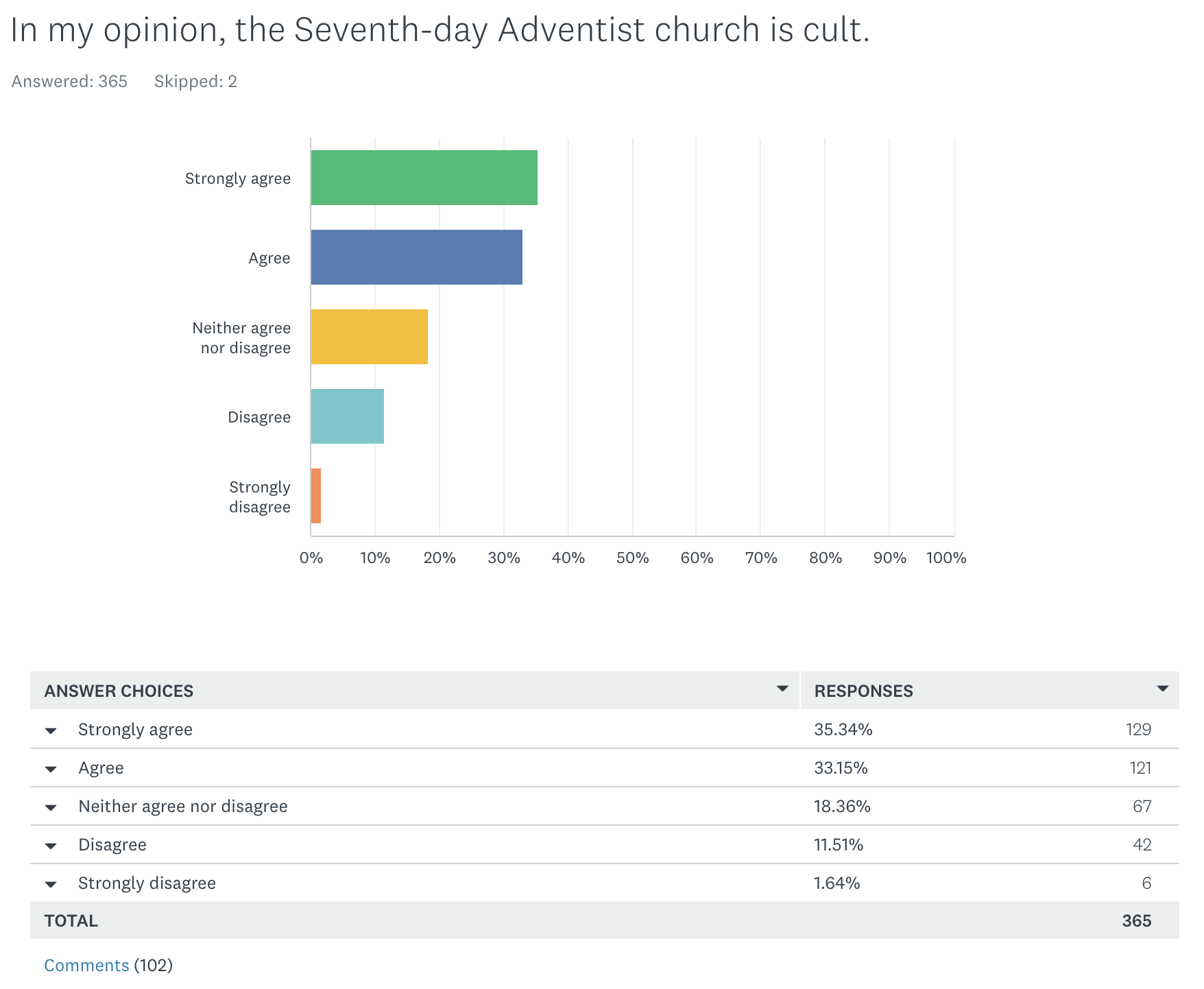“The SDA cult needs to be comprehensively exposed to as wide an audience of SDAs and non-SDAs as possible, and then be roundly and formally denounced by as many people and institutions as possible. E.G. White was likely a psychopathic con artist who may someday be viewed as one of the most impacting con artists in recorded history.”
-male Millennial survey respondent
The cult question
Strong words of accusation
Reading through the comments has been difficult and fascinating. As a sociologist I find most of the comments inherently interesting, of course, but reading some offerings has been difficult knowing that a real person spent time thinking about and writing those words. This comment from a Millennial male from the United States was particularly striking in its passion and deep conviction.
In response to Q27 “In as few or as many words as you like, please tell us about your process and experience of leaving Adventism.” he wrote,
“The SDA cult had a strong and lasting negative impact on me for many years after I internally denounced the faith. It has taken me decades to develop a deepened awareness of just how systematically diabolical this cult system is, how damaging it has been to me throughout my entire childhood and adult life, and how dangerous it is to the survival of the human race for Adventism to be allowed to continue to freely prey upon on its victims in the manner that it does. Adventism and the SDA educational system is, by design, a methodical, strategic brainwashing camp that actively employs shame-based cognitive, behavioral, and emotional mind-control techniques within its milieu in order to deeply indoctrinate its followers and their current and future offspring. This is particularly damaging to Adventist children and should meet the minimum legal threshold necessary to define some SDA practices as inherently abusive towards children, and yet it is somehow not defined or viewed that way socially or legally. The SDA cult needs to be comprehensively exposed to as wide an audience of SDAs and non-SDAs as possible, and then be roundly and formally denounced by as many people and institutions as possible. E.G. White was likely a psychopathic con artist who may someday be viewed as one of the most impacting con artists in recorded history. The harm that Adventism has caused and continues to cause globally is being vastly underrepresented and undervalued, and warrants significant further research and social, political, legal, ethical, psychological, and theological scrutiny.”
techniques within its milieu in order to deeply indoctrinate its followers and their current and future offspring. This is particularly damaging to Adventist children and should meet the minimum legal threshold necessary to define some SDA practices as inherently abusive towards children, and yet it is somehow not defined or viewed that way socially or legally. The SDA cult needs to be comprehensively exposed to as wide an audience of SDAs and non-SDAs as possible, and then be roundly and formally denounced by as many people and institutions as possible. E.G. White was likely a psychopathic con artist who may someday be viewed as one of the most impacting con artists in recorded history. The harm that Adventism has caused and continues to cause globally is being vastly underrepresented and undervalued, and warrants significant further research and social, political, legal, ethical, psychological, and theological scrutiny.”
A cult?
This respondent is not alone in referring to Adventism as a cult. As you can see from the the data below most- more than two thirds- of our respondents agree with this assessment.

“Cult-ish”
The binary of is or is not a cult is clearly not nuanced enough for many. One respondent viewed the word ‘cult’ as a smear.
“Every time I’ve heard the word cult used to describe a group, it’s been a smear attempt, so I don’t know how helpful the term is. The SDA church certainly can be a high control group, but the experience of such is so depended on where/when you interacted with it and who you were that it’s hard to give a global label like ‘cult.'”
But how do you define a cult? These next three comments dance around the term.
“The SDA church may be far reaching, but its insistence on absolute dedication, it’s thorough indoctrination of members from birth to college, shows it’s ability to keep members under control. The SDA church employs guilt, ridicule, harrassment, gaslighting…etc. to get members to stay. They use the “bait and switch” method to get new members. It sounds good when you’re studying with them, and then once you’re baptized, they start letting you know how you’re not ‘meeting standard’.”
“Not a cult in that you are technically free to leave whenever you’d like, but the mindset and community can feel extremely cult-like.”
“This depends on your definition of a cult. In some ways, it is. I don’t think it is officially considered one. It is a fun insult to hurl at Adventism anyway. Or at least to call it ‘cult-ish.'”
A misused term?
From a sociological perspective, the term ‘cult’ is problematic. In a 1993 Review of Religious Research article entitled “Definitions of Cult: From Sociological-Technical to Popular-Negative” Richardson provides deep historical background behind the usage of the term and ultimately advises that its use should be avoided by academics. The term ‘cult’ in popular culture is clearly intended to be pejorative and accusatory, typically inferring excessive control and blind devotion.
In the context of our survey where our intent is to hear and report what the respondents tell us, I think it is inappropriate for me to weigh in as to my sociological viewpoint at least as far as labeling the Adventist church a cult. That debate aside, the impact of this church on children can be an issue. The Millennial respondent quoted above does, however, make a point that deserves greater attention. He said,
“This is particularly damaging to Adventist children and should meet the minimum legal threshold necessary to define some SDA practices as inherently abusive towards children, and yet it is somehow not defined or viewed that way socially or legally.”
Many have argued that religious indoctrination is child abuse and that “Children have been terrorized with the threat of living an eternity in a lake of fire. That’s unequivocally been the source of nightmares and PTSD for millions of kids.” I am not going to disagree.
Your thoughts? Contact us: exsda@proton.me and/or arcaro@elon.edu.


 Follow
Follow